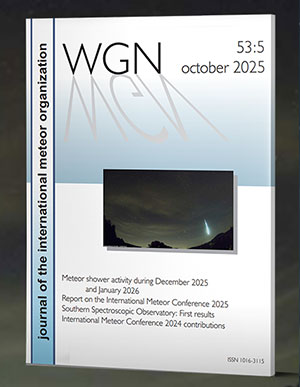Two strong activity peaks of the Leonid meteor shower were predicted. The times fell between 03:48 to 04:04 UT for the first one, and between 10:23 to 10:47 UT for the second peak, both on November 19, 2002.
A first activity analysis from the reports of 86 observers, who logged 19443 Leonids, is given below. The ZHR refers to a stellar limiting magnitude of +6.5, a radiant elevation of 90 deg, and counts of single observers. A population index of r=2 was applied, although the inspection of data suggests a large abundance of faint meteors, thus a larger r. The ZHRs would increase likewise.
The peak time of the first maximum is 04:10 UT with ZHR=2350. The second peak is found near 10:50 UT or a few minutes earlier with ZHR=2660. Both peaks occurred later than the predictions by about the same time lapse. The predictions of the Leonid stream model of Vaubaillon (WGN 30:5, 2002) are closest to reality according to this first analysis.
----------------------------------------- Nov UT Sollong N LEO ZHR +/- ----------------------------------------- 16 2000 234.257 2 10 19 6 17 0300 234.551 6 15 6 2 17 2200 235.349 13 96 37 4 18 0400 235.601 12 78 26 3 18 2000 236.273 21 431 98 5 18 2300 236.399 22 195 100 7 19 0000 236.441 26 330 101 6 19 0110 236.490 27 271 188 11 19 0140 236.511 24 218 201 14 19 0210 236.532 21 266 249 15 19 0220 236.539 20 332 305 17 19 0240 236.553 36 342 300 16 19 0255 236.564 16 157 275 22 19 0306 236.571 22 205 375 26 19 0316 236.578 28 329 497 27 19 0327 236.586 27 484 583 27 19 0335 236.591 48 1047 756 23 19 0343 236.597 20 412 930 46 19 0345 236.599 32 719 1162 43 19 0353 236.604 35 768 1344 49 19 0358 236.608 47 1341 1542 42 19 0402 236.610 36 1248 1966 56 19 0408 236.615 31 1335 2353 64 19 0413 236.618 17 912 2332 77 19 0418 236.622 30 1253 1995 57 19 0426 236.627 35 933 1367 45 19 0436 236.634 38 681 989 38 19 0447 236.642 24 416 635 31 19 0500 236.651 31 395 675 34 19 0518 236.664 50 505 1014 45 19 0535 236.676 22 189 572 42 19 0555 236.690 15 97 144 15 19 0620 236.707 15 87 142 15 19 0800 236.777 14 166 272 21 19 0905 236.823 21 217 307 21 19 0930 236.840 27 99 152 15 19 0947 236.852 21 72 267 32 19 1000 236.861 21 128 293 26 19 1010 236.868 31 192 707 51 19 1018 236.874 19 396 907 46 19 1023 236.877 15 134 965 83 19 1030 236.882 27 288 1364 80 19 1040 236.889 26 350 2108 112 19 1050 236.896 28 587 2656 110 19 1100 236.903 19 297 1061 62 19 1112 236.912 17 130 490 43 19 1135 236.928 7 184 366 27 19 2200 237.366 6 99 123 12 20 0500 237.660 11 4 10 5 -----------------------------------------
Solar longitudes refer to equinox J2000.0, N is the number
of observing periods involved in the average ZHR, LEO is the
number of Leonid meteors. The error of the ZHR is simply
ZHR/sqrt(LEO) here. No special zenith exponent was applied
to account for non-geometrical effects in radiant elevation
correction.
![[Leonid ZHR graph]](http://www.imo.net/docs/images/leonid2002-124.jpg)
Figure 1: ZHR graph of the Leonids 2002
We are very grateful to the enthusiastic community of meteor
observers who have sent in their results, mostly through the
online express form. All observers are encouraged to send
their FULL DATA including magnitudes and possibly shorter
time-bins for the counts within the next week.
(An error in the online form script has lead to erroneous output in geographical latitude and radiant elevation; the actual results presented here are not affected though.)




 You saw something bright and fast? Like a huge shooting star? Report it: it may be a fireball.
You saw something bright and fast? Like a huge shooting star? Report it: it may be a fireball.  You counted meteors last night? Share your results with us!
You counted meteors last night? Share your results with us!  You took a photo of a meteor or fireball? You have a screenshot of your cam? Share it with us!
You took a photo of a meteor or fireball? You have a screenshot of your cam? Share it with us!  You caught a meteor or fireball on video? Share your video with us!
You caught a meteor or fireball on video? Share your video with us!